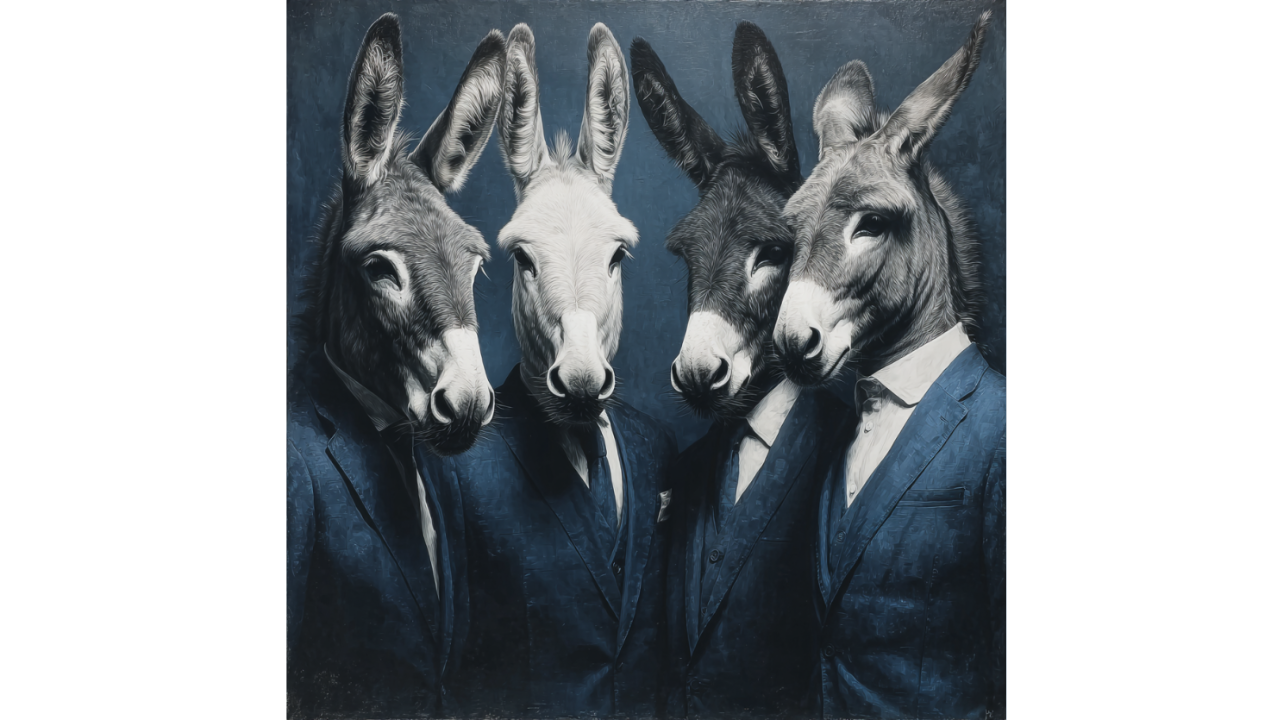1 min read
Doug Fiefia's Appointment to Lead a National AI Task Force
Sometimes the most important political victories happen before most people realize a battle was even being fought. While the tech world obsesses over...
-2.png)
The most striking finding in NBC News's comprehensive poll of 19,410 Americans isn't what divides us on artificial intelligence—it's what unites us in our uncertainty. Across party lines, age groups, and educational backgrounds, Americans are remarkably consistent in one thing: we're split almost perfectly down the middle on nearly every aspect of AI's role in our lives.
The numbers tell a story of a nation grappling with technological change without clear guidance from traditional political or demographic markers that usually predict our opinions.
The Great AI Uncertainty: Americans Evenly Divided
The NBC News Decision Desk Poll powered by SurveyMonkey, conducted from May 30-June 10 with a margin of error of plus or minus 2.1 percentage points, reveals that slightly less than half—44%—of U.S. adults surveyed said they used AI tools like ChatGPT, Google Gemini, or Microsoft Copilot "sometimes" or "very often," while 56% said they used these tools "rarely" or "never."
What's remarkable is the consistency across political affiliations. The poll found no meaningful breakdowns in AI tool use by political party: 14% of Republicans, 14% of Democrats, and 15% of independent voters said they used AI tools "very often." Another 28% of Republicans, 31% of Democrats, and 31% of independent voters said they used AI tools "sometimes."
This partisan unity on AI usage contrasts sharply with the deep divisions Americans typically show on technology policy and innovation issues.
When asked about AI's impact on the future, Americans revealed an almost mathematical split in their expectations. While 44% of American adults surveyed said they thought AI would make their and their families' lives "much better" or "somewhat better," 42% of respondents said they thought AI would make their and their families' futures "somewhat worse" or "much worse."
The intensity of these feelings tells an important story about American ambivalence. Just 7% of those surveyed said they felt AI would make lives "much" better, with 37% choosing the "somewhat" option. Similarly, only 16% said AI would make their futures "much" worse, while the majority of concerned respondents (26%) chose "somewhat worse."
Even these future-focused questions showed little partisan variation. Exactly half of Republicans responded that they expected their futures to be "much better" or "somewhat better" due to AI, compared to 42% of Democrats and 41% of independent voters. Meanwhile, 39% of Republicans said they thought AI would make their families' futures worse, compared to 47% of Democrats and 43% of independents.
Perhaps nowhere is America's AI ambivalence more consequential than in education, where the poll revealed a near-perfect split on classroom AI integration. Just over half—53%—of survey respondents agreed that the integration of AI tools in the classroom could better prepare students for the future, while 47% thought that prohibiting the use of AI tools in the classroom would better prepare students.
This divide comes as educators nationwide grapple with the encroachment of increasingly accessible technologies capable of helping students research, study, or cheat more efficiently. While some teachers have swung back toward handwritten essays and in-class work to prevent AI use, others have embraced AI by intentionally integrating it into assignments.
The educational technology landscape reflects this uncertainty. Last year, OpenAI rolled out ChatGPT Edu, a version of its flagship chatbot made specifically for use on college campuses. Google's Gemini and Microsoft's Copilot are also among the major AI models that have introduced tools for education. AI-powered tutors from newer platforms like SchoolAI to traditional ones like Khan Academy increasingly offer services for educators.
Again, partisan differences proved minimal. Slightly more Democrats—57%—agreed that schools actively integrating AI better prepare students for the future, compared to 50% of Republican voters and 51% of independent voters. Meanwhile, 50% of Republicans agreed that schools prohibiting AI use better prepare students, compared to 49% of independent voters and 43% of Democrats.
Perhaps most surprisingly, the poll revealed little variation in views across age groups regarding AI in schools. Adults ages 18 to 29 were evenly split, with 50% supporting schools incorporating AI use and 50% supporting schools that prohibit AI use. The next-oldest generation—those ages 30 to 44—showed 54% supporting schools using AI and 46% supporting schools that prohibit AI.
This age-based consensus contradicts expectations that younger Americans would be more supportive of AI integration in education, and suggests that concerns about AI's educational impact transcend generational boundaries.
These divided public opinions emerge against a backdrop of minimal federal AI regulation. President Donald Trump has undone many of the initial attempts at regulation and oversight put in place by then-President Joe Biden, and many Republicans have embraced the Trump administration's anti-regulation stance on AI.
However, Trump also signed an executive order in April 2025 to advance AI education for American youth, directing the creation of public-private partnerships for K-12 AI education and instructing the Secretary of Education to prioritize AI in discretionary grant programs for teacher training.
This regulatory uncertainty occurs while college professors and teachers across the U.S. have expressed exasperation at the potential influence that increasing student use of AI could have on young minds, and many progressives have balked at AI's potential influence on the job market and the environment.
The NBC poll results contrast sharply with expert opinions on AI. According to Pew Research Center surveys, AI experts are far more positive than the public about AI's potential, with 56% of experts believing AI will have a positive impact on the United States over the next 20 years, compared to much lower public enthusiasm.
However, both groups share concerns about AI governance. More than half of U.S. adults (55%) and a similar share of AI experts (57%) say they want more control over how AI is used in their lives, and both groups worry more that government regulation of AI will be too lax than overly excessive.
The AI education debate occurs within a broader context of American educational priorities. Research from Education Next suggests that the American public is less concerned about hot-button education issues than about the nuts and bolts of teaching and learning. Recent surveys show America's schools received an average grade of B from students, up from B- in previous years, with the highest-rated aspects including preparing students for the next year and support in core subjects.
Yet career exploration and excitement about learning—areas where AI tools might have significant impact—received the lowest ratings overall from students, suggesting opportunities for thoughtful AI integration.
The classroom reality reveals the complexity of AI implementation. According to Pew Research, about one-quarter of U.S. teachers say AI tools like ChatGPT do more harm than good in K-12 education, while fewer than one-in-ten say these tools do more good than harm. High school teachers are more likely than elementary and middle school teachers to hold negative views about AI tools, with about a third of high school teachers saying these tools do more harm than good.
Meanwhile, among teens who have heard of ChatGPT, 19% say they have used it to help with schoolwork, with usage increasing in higher grades. Students show nuanced views about appropriate AI use: 69% say it's acceptable to use ChatGPT to research new topics, 39% for solving math problems, but only 20% for writing essays.
The NBC poll's findings suggest that America's approach to AI will likely be shaped more by pragmatic concerns than ideological positions. The lack of strong partisan divisions on AI issues creates both opportunities and challenges for policymakers seeking to develop coherent AI governance frameworks.
The near-perfect splits on key questions—44% vs. 42% on AI's future impact, 53% vs. 47% on classroom AI use—suggest that American attitudes toward AI remain genuinely unsettled rather than reflecting hardened ideological positions. This fluidity could allow for evidence-based policy development, but also creates uncertainty for educators, businesses, and technologists trying to plan for the future.
The educational divide is particularly significant because schools serve as laboratories for broader social adaptation to new technologies. How American schools navigate AI integration may well determine how the broader society approaches AI adoption in other domains.
The NBC poll reveals a nation in transition, neither rejecting nor embracing AI wholesale, but approaching it with measured uncertainty. This cautious pragmatism may actually be America's strength as we navigate an AI-enabled future that remains genuinely uncertain.
Rather than viewing these splits as problematic indecision, we might see them as healthy democratic deliberation about technologies that will reshape work, education, and daily life. The lack of strong partisan or demographic predictors of AI attitudes suggests that Americans are thinking independently about these issues rather than defaulting to tribal positions.
The challenge for leaders in government, education, and business will be designing AI policies and implementations that acknowledge this genuine uncertainty while still moving forward constructively. The poll suggests Americans are ready for nuanced approaches to AI that maximize benefits while minimizing risks—but they're not ready to embrace AI uncritically or reject it entirely.
In a nation often characterized by polarization, America's measured uncertainty about AI might be exactly what we need as we write the next chapter of human-machine collaboration.
Need help navigating AI adoption in your organization? Winsome Marketing's growth experts help companies develop strategic AI implementations that balance innovation with practical concerns. Let's build an AI strategy that works for your stakeholders.

1 min read
Sometimes the most important political victories happen before most people realize a battle was even being fought. While the tech world obsesses over...

Over 1,000 Amazon employees just signed an open letter that tech executives will pretend doesn't exist. The petition, organized by Amazon Employees...
-3.png)
China is pouring nearly $100 billion into artificial intelligence development this year—a staggering 48% increase from 2024—while America's...